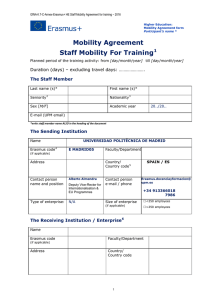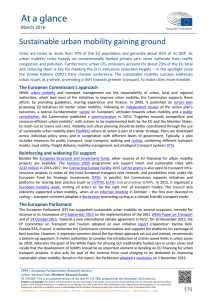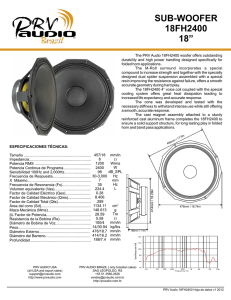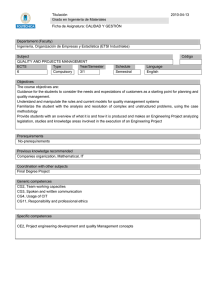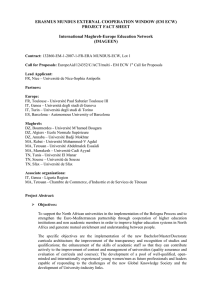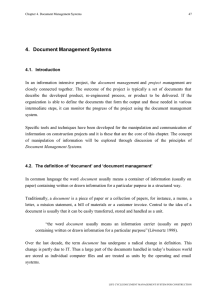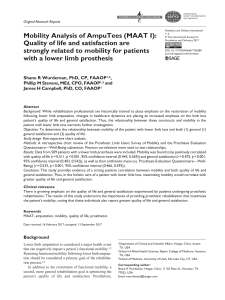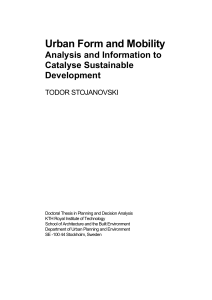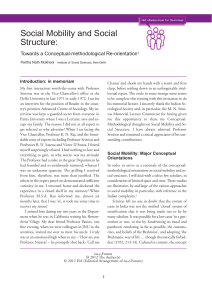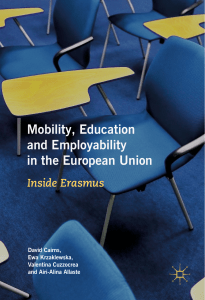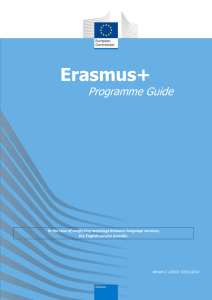CONSMUPA`S ERASMUS POLICY STATEMENT
Anuncio
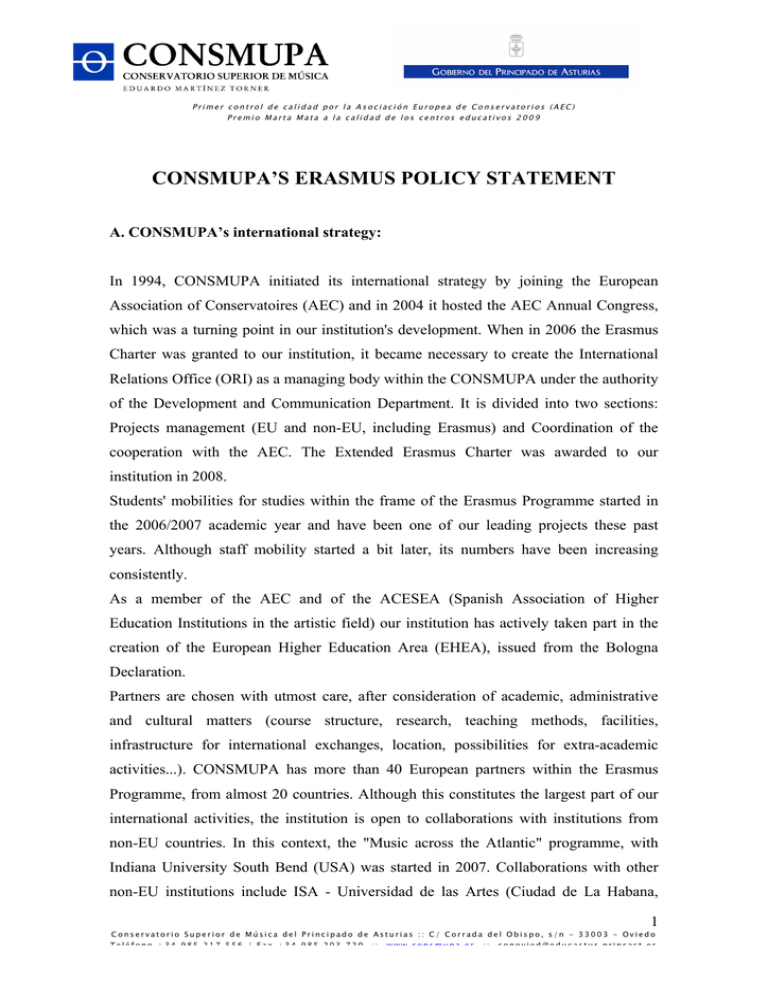
Primer control de calidad por la Asociación Europea de Conservatorios (AEC) Premio Marta Mata a la calidad de los centros educativos 2009 CONSMUPA’S ERASMUS POLICY STATEMENT A. CONSMUPA’s international strategy: In 1994, CONSMUPA initiated its international strategy by joining the European Association of Conservatoires (AEC) and in 2004 it hosted the AEC Annual Congress, which was a turning point in our institution's development. When in 2006 the Erasmus Charter was granted to our institution, it became necessary to create the International Relations Office (ORI) as a managing body within the CONSMUPA under the authority of the Development and Communication Department. It is divided into two sections: Projects management (EU and non-EU, including Erasmus) and Coordination of the cooperation with the AEC. The Extended Erasmus Charter was awarded to our institution in 2008. Students' mobilities for studies within the frame of the Erasmus Programme started in the 2006/2007 academic year and have been one of our leading projects these past years. Although staff mobility started a bit later, its numbers have been increasing consistently. As a member of the AEC and of the ACESEA (Spanish Association of Higher Education Institutions in the artistic field) our institution has actively taken part in the creation of the European Higher Education Area (EHEA), issued from the Bologna Declaration. Partners are chosen with utmost care, after consideration of academic, administrative and cultural matters (course structure, research, teaching methods, facilities, infrastructure for international exchanges, location, possibilities for extra-academic activities...). CONSMUPA has more than 40 European partners within the Erasmus Programme, from almost 20 countries. Although this constitutes the largest part of our international activities, the institution is open to collaborations with institutions from non-EU countries. In this context, the "Music across the Atlantic" programme, with Indiana University South Bend (USA) was started in 2007. Collaborations with other non-EU institutions include ISA - Universidad de las Artes (Ciudad de La Habana, 1 Conservatorio Superior de Música del Principado de Asturias :: C/ Corrada del Obispo, s/n - 33003 - Oviedo Teléfono +34 985 217 556 / Fax +34 985 203 720 :: www.consmupa.es :: [email protected] Primer control de calidad por la Asociación Europea de Conservatorios (AEC) Premio Marta Mata a la calidad de los centros educativos 2009 Cuba) in 2011 and 2012. Possible future collaborations include other Higher Education Institutions from the USA and the Middle East, as well as from any other geographical area, since the achievement of an intercultural perspective at all levels is one of the driving forces of our institution's strategy. The target groups of our mobility activities are all students and staff (including both teaching and administrative staff). The most important objectives of our mobility activities are: - Creating an enriched environment for the educational community. - Improving the quality and efficiency of education and training. - Increasing mobility rates among students and staff. - Fostering research activities being developed by our staff and students. - Making it easier for students to access the job market in the future. - Increasing foreign language proficiency among students and staff. - Increasing the number of foreign students and staff. - Promoting equity, social cohesion and active citizenship. - Promoting cross sector cooperation, creativity, innovation and entrepreneurship. - Raising the institution's international profile and reputation. These will be achieved by: - Signing new inter-institutional agreements, including non-EU institutions. - Participating in multilateral projects such as joint degrees, curriculum development, research, specialization and artistic production projects. - Encouraging staff and students to undertake periods of mobility. - Receiving our partner's students and staff. - Inviting staff from enterprises to deliver training courses or workshops oriented towards the job market. - Implementing international placements for current and former students. - Establishing strategic partnerships among the institution and key stakeholders (enterprises in the art field, such as orchestras, local/regional authorities, other education and research institutions...). 2 Conservatorio Superior de Música del Principado de Asturias :: C/ Corrada del Obispo, s/n - 33003 - Oviedo Teléfono +34 985 217 556 / Fax +34 985 203 720 :: www.consmupa.es :: [email protected] Primer control de calidad por la Asociación Europea de Conservatorios (AEC) Premio Marta Mata a la calidad de los centros educativos 2009 - Assuring the presence of CONSMUPA at important international and national events: AEC annual Congress, AEC and OAPEE (Spanish National Agency for the Lifelong Learning Programme) Meetings of International Relations Coordinators, work-groups dedicated to adapting the educational institutions to the new European regulations... - Striving to find additional sources of funding for international mobility activities. - Displaying the Erasmus Charter and the Erasmus Policy Statement on the institution's website. - Promoting international activities and their results. Further actions that are being studied are: - Implementing a double/multiple/joint Master's degree to foster student degree mobility at Master level. - Offering degree courses in English. - Collaborating with other HEIs in the EHEA in the development and implementation of Doctorate Degree Programs. Our institution declares to guarantee equal opportunities for students and staff irrespectively of their age, sex, race, religion, disability or socio-economic status. B. CONSMUPA’s strategy for the organisation and implementation of international (EU and non-EU) cooperation projects in teaching and training in relation to projects implemented under the Erasmus + Programme. The organisation and implementation of international cooperation projects in teaching and training is done by the International Relations Office although all important decisions (distribution of grants, academic recognition of studies, outline of international policy...) are taken by the International Committee (formed by the Director, the International Relations Coordinator, the Head of the Communication and Development Department, the institution’s Secretary and a teacher and a student, both members of the Institution’s Council). 3 Conservatorio Superior de Música del Principado de Asturias :: C/ Corrada del Obispo, s/n - 33003 - Oviedo Teléfono +34 985 217 556 / Fax +34 985 203 720 :: www.consmupa.es :: [email protected] Primer control de calidad por la Asociación Europea de Conservatorios (AEC) Premio Marta Mata a la calidad de los centros educativos 2009 Measures to ensure high quality in mobility: - All studies undertaken in mobility are fully recognized by the institution through the use of the Learning Agreement. - The ECTS credit system is applied for mobility (old and new curricula) as well as for internal use (new curricula). - Information on curricula is available in the International Office as well as on the institutional website (www.consmupa.es) and at the Secretary's office. - The International Office and each student's tutor provide counselling for outgoing students. - Tutoring for incoming students is guaranteed by one-to-one tuition typical of music conservatoires. - Integration of incoming students is achieved in the group performance lessons such as orchestra / band, chamber music, choir, etc. - A "Peer Mentor" programme has been implemented to help incoming students in the first weeks of their mobility. - Language tuition is offered to incoming students. - A staff member of the same branch coordinates each visiting staff mobility, ensuring the highest quality. - When available, staff at the International Office helps with the translation of Masterclasses given by visiting international professors. - Staff is encouraged to take part in mobility activities by getting the necessary leave when a project is approved. - When there are funds available, the institution helps with travel expenses of staff's mobility. C. Expected impact of CONSMUPA’s participation in the Programme on the modernisation of our institution (for each of the 5 priorities of the Modernisation Agenda) in terms of the policy objectives we intend to achieve: The participation in the Programme is key to the modernisation of our institution, since it will allow students and staff to come into contact with different ways of 4 Conservatorio Superior de Música del Principado de Asturias :: C/ Corrada del Obispo, s/n - 33003 - Oviedo Teléfono +34 985 217 556 / Fax +34 985 203 720 :: www.consmupa.es :: [email protected] Primer control de calidad por la Asociación Europea de Conservatorios (AEC) Premio Marta Mata a la calidad de los centros educativos 2009 teaching/learning and with key stakeholders, which will no doubt contribute to a richer environment at the institution and help to achieve the goals of the Modernisation Agenda: a) Increasing attainment levels: by implementing and developing transnational projects and selecting participants with transparent and fair procedures, students coming from all social and income backgrounds will get the same opportunities. The diversity of projects funded by the Programme can also attract a broader cross-section of society. The implementation of a Master's degree will lead to more people wanting to continue their studies and becoming doctoral candidates, thus fostering research. The collaborations with other institutions within the Programme will provide our students with more information on educational opportunities and outcomes. b) Improving the quality and relevance of higher education: the institution will remain flexible as regards the curricula, using the following in order to modify them and attune them to current and emerging labour market needs: - New perspectives gained thanks to the participation in mobility programmes. - Results obtained by monitoring the career paths of students that participated in the Programme. The Programme will also be an excellent tool for professional development of staff, as past mobilities have already proved. c) Strengthening quality through mobility and cross-border co-operation: by increasing mobility rates among students and staff (which will be possible thanks to the Programme) both target groups will improve their professional, social and intercultural skills and employability. Efforts will be made to eliminate unnecessary barriers to crossborder co-operation and exchanges and to improve access opportunities for students from other countries. d) Linking higher education, research and business for excellence and regional development: the participation in the Programme can mean the establishing of cooperation not only with other HEIs but also with research organisations and enterprises, which will contribute to develop entrepreneurial skills and creative and innovative attitudes, as well as more interactive learning environments and will strengthen knowledge-transfer infrastructure. 5 Conservatorio Superior de Música del Principado de Asturias :: C/ Corrada del Obispo, s/n - 33003 - Oviedo Teléfono +34 985 217 556 / Fax +34 985 203 720 :: www.consmupa.es :: [email protected] Primer control de calidad por la Asociación Europea de Conservatorios (AEC) Premio Marta Mata a la calidad de los centros educativos 2009 e) Improving governance and funding: thanks to the Programme, additional sources of funding (essential to sustain and expand high-quality higher education) can be obtained. Moreover, through the exchange of ideas and good practices that the participation in the Programme entails, our institution will no doubt be able to assess its governance mechanisms and establish ways of improving them. 6 Conservatorio Superior de Música del Principado de Asturias :: C/ Corrada del Obispo, s/n - 33003 - Oviedo Teléfono +34 985 217 556 / Fax +34 985 203 720 :: www.consmupa.es :: [email protected]
